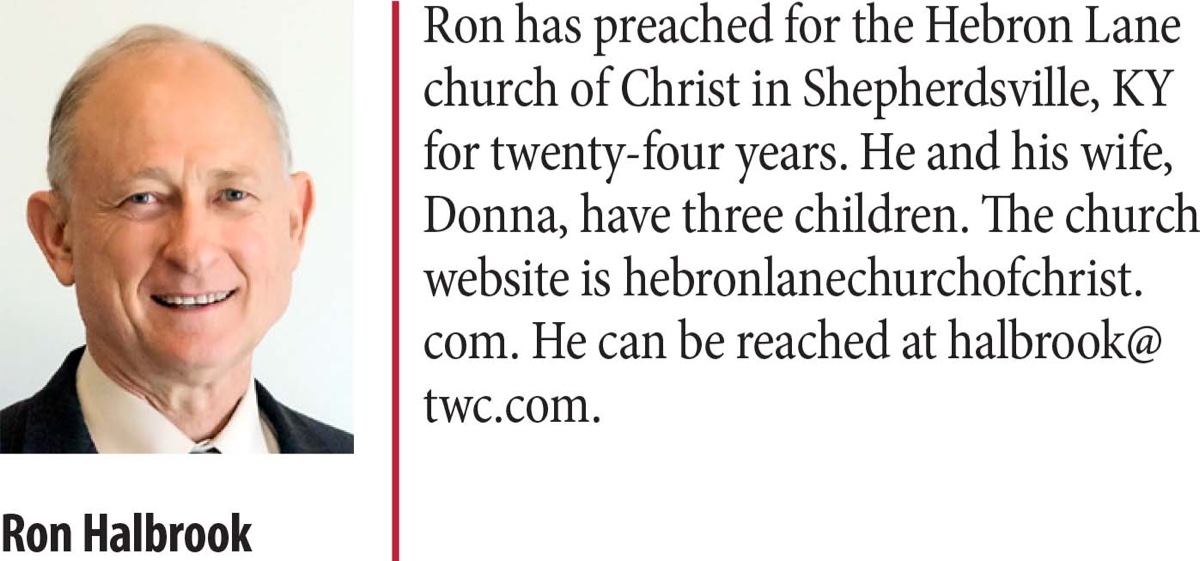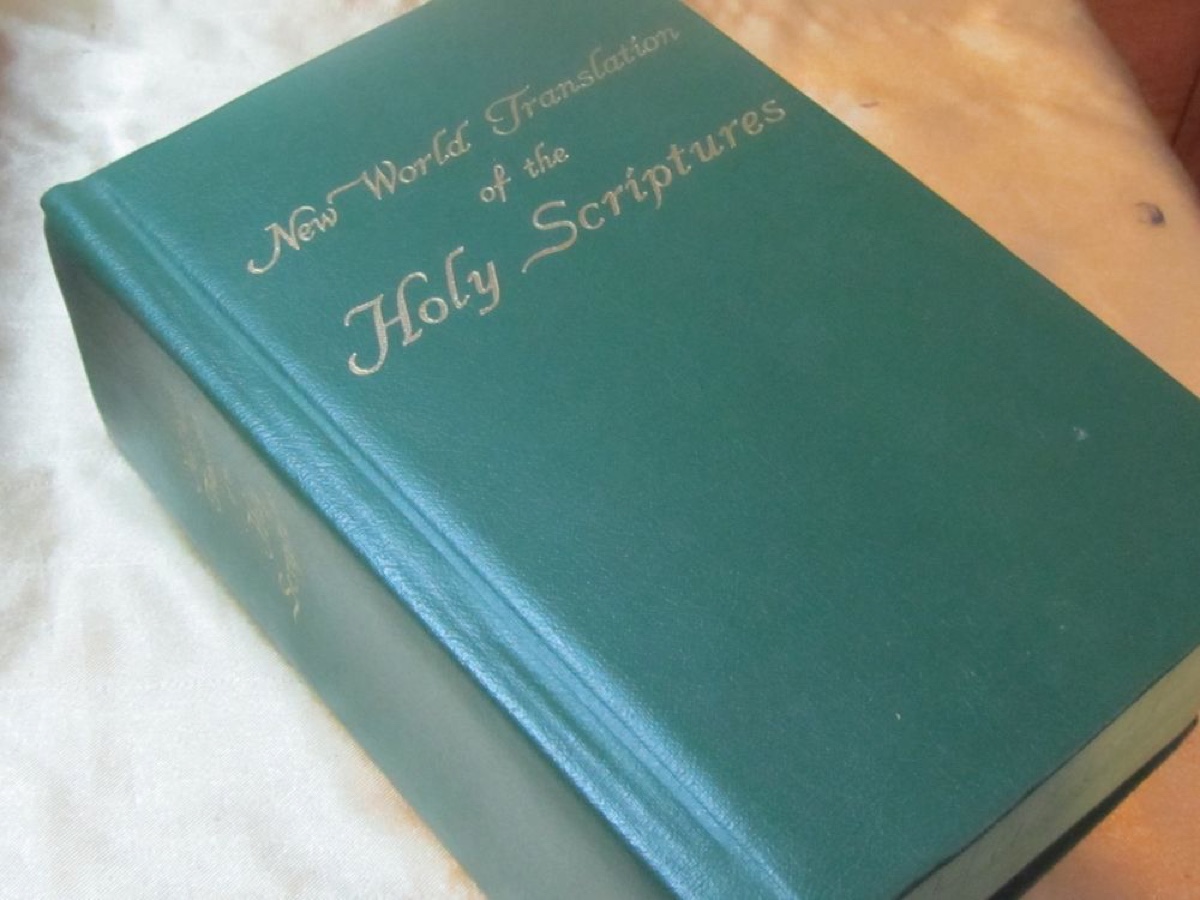By Ron Halbrook
Synopsis: The New World Translation of the Bible by the Jehovah’s Witnesses is a perversion rather than a translation of the Bible. One of its main agendas is eliminating the deity of Christ from the Scriptures.
The Jehovah’s Witnesses cult has their own Bible. The Watchtower Bible and Tract Society of New York, Inc. published their own interpretations as Scripture entitled New World Translation of the Holy Scriptures (published in parts between 1950-60; and in whole with revisions in 1961; 1970 rev.; 1984 rev.; 2013 rev.).
Knowing this first, that no prophecy of the Scripture is of any private interpretation.
For the prophecy came not in old time by the will of man: but holy men of God spake as they were moved by the Holy Ghost (2 Pet. 1:20-21).
The words of Scripture originated in the Holy Spirit, not in the will, reason, or interpretation of the human writers. Bible translators must give a true and accurate representation of the biblical manuscripts without substituting their own theories or theologies for the text. Honest analysis shows that the New World Translation is Scripture as private interpretation.
The New World Bible Translation Committee was unqualified and incompetent for the task of translating the Bible from the original Hebrew and Greek languages. The Watchtower Bible and Tract Society refuses to reveal the translators’ names. Five names of the seven-man committee were revealed by Raymond V. Franz, who was a member of the Governing Body of the Jehovah’s Witnesses (1971-80), after he was expelled: Nathan H. Knorr (Chairman and primary traslator), Frederick W. Franz, George D. Gangos, Karl Klein, and A.D. Schroeder. William Cetnar, who worked at the Society’s international headquarters in 1950 when the project began, identified one more contributor after he left the organization: Milton G. Henschel.
None of these men had the training or qualifications to translate the Bible. The most “qualified” was Fred Franz, who finished only two years of college work, including minimal exposure to Greek classes and who was self-taught in some Hebrew. Franz explained that he was guided by invisible communications from “angels of different ranks who control Witnesses” (testimony in 1954 trial in Scotland; E.C. Gruss, Apostles of Denial: 32). He performed most of the work, including the revisions through 1984. Paul warned of such men who pervert the truth while claiming angelic guidance (Gal. 1:6-9). The Society’s highest leaders hide these facts from their followers.
Jehovah’s Witnesses deny the deity of Jesus Christ, and their New World Translation eliminates this great truth from the Bible as much as possible. According to them, all standard Bible translations are corrupted on the deity of Jesus Christ and other pet topics essential to their unique religion.
The Jehovah’s Witnesses cult claims that God created first an archangel through whom all other angels and the universe would be created. That angel is Michael, a name “applied to God’s Son before he left heaven to become Jesus Christ and also after his return” (Aid to Bible Understanding, 1971, p. 1152). This theology forces them to dilute every passage affirming the divinity of Jesus Christ.
John 1:1 says, “In the beginning was the Word, and the Word was with God, and the Word was God.” The New World Translation notoriously renders it, “In the beginning was the Word, and the Word was with God, and the Word was a god.” This is an effort to reduce Jesus Christ to a created being with certain God-like characteristics.
This perversion is based on the premise that “theos” (the Greek word for God) is arthrous or is preceded by the definite article, “o,” for “the” in the clause “the Word was with God,” but “theos” is anarthrous, or is not preceded by the definite article, “o,” for “the” in the clause “the Word was God.” This does not indicate that God in the second clause is a lesser or created being. The absence of the definite article here stresses “the quality or character” of deity or Godhood rather than personal identity (see Dana & Mantey, A Manual Grammar of the Greek New Testament, pp. 149-150).
The personal identity of God as the Father is indicated in the first clause by the presence of the definite article. The personal identity of Jesus is noted by “the Word” and His divine nature is emphasized by “God”: “the Word was God.” The person called the Word is full deity or divinity in nature.
The word theos for God appears in John 1:6, 12, and 13, without the definite article in the Greek text. The New World Translation reverses its phoney rule imposed on verse 1 to produce “a god” and translates all these other verses properly as “God.” Why “a god” only in verse 1? Their cultic theology demands it.
The New World Translation dodges the deity of Jesus Christ in John 8:58 by substituting the private interpretation, “Before Abraham came into existence, I have been,” for the actual text, “Before Abraham was, I am.” This faulty translation is an attempt to avoid the obvious claim of Jesus to be the Great “I AM” of Exodus 3:14, i.e., deity. The Jews knew that was precisely His point and immediately picked up stones to execute Him for blasphemy (John 8:59; cf. 10:30-39). The mere claim to be older than Abraham would have elicited only laughter and ridicule, but the claim to be “I AM” elicited the charge of blasphemy.
Paul proclaims the deity of Jesus Christ in Colossians 1:15 by describing Him as “the image of the invisible God, the firstborn of every creature.” First, the incarnate Christ is the visible image of the invisible God, a clear affirmation of His deity. Second, He holds the status of the firstborn in or over the universe, but what does firstborn mean?
The family culture of Old Testament times included the right of primogeniture, i.e., a preeminent or dominant status granted to the male child born first in each family, which carried the prerogatives of leadership and inheritance. This right could be transferred as happened when Jacob (later named Israel) obtained the birthright, which originally belonged to Esau, who was born first. God told Moses to command the Pharaoh of Egypt to release the Jews from slavery because He ordained them for a preeminent role: “Israel is my son, even my firstborn” (Exod. 4:22). In this case, the dominant role was held by the child born second.
In a similar use of the term firstborn, God promised that His chosen king would be preeminent above all others in Psalm 89:27, which says, “I will make Him my firstborn, higher than the kings of the earth.” This refers to the role or position of dominance, not to the first male born into a family or even to the first man to rule as a king.
Colossians 1:16-18 shows why the role and position of Christ is that of the firstborn. He created all things, He existed before all things, He sustains all things, and He is the head of the church—“that in all things He might have the preeminence.”
The Jehovah’s Witnesses pervert Colossians 1:15 in a way which creates grammatical chaos in the context. Jesus is here called, in The New World Translation, “the firstborn of all creation,” a harmless translation. Their theology forces them to interpret this to mean He was the first thing God created, which gives them grammatical problems in verses 16-17 which refer four times to Him creating and sustaining “all things.” If He is a created being, and He created all things, then He created himself.
To escape this contradiction, it is necessary to insert “other” four times to make the text read: “all other things.” Until the revision of 2013, “other” was inserted in brackets. There is no Greek word for “other” in verses 16-17, nor does anything in the context justify inserting it, with or without brackets. Even when these brackets are inserted in their translation, Jehovah’s Witnesses commonly dropped them when they quoted these verses in their other publications. Now all pretense of using brackets is gone.
The private interpretation, “other,” is added to the text in violation of the direct command of God repeated several times not to add anything to His Word (Deut. 4:2; Prov. 30:6; Rev. 22:18). This sin is avoided by recognizing that “firstborn” does not mean “created first” but refers to the preeminence of Jesus Christ over all creation by His divine nature, “the image of the invisible God” (Col. 1:15).
Hebrews 1:8-9 quotes Psalm 45:6-7 and applies it to Jesus. Verse 8 affirms, “But unto the Son He saith, Thy throne, O God, is for ever and ever: a sceptre of righteousness is the sceptre of thy kingdom.” Dozens of translations translate the verse the same way with only minor variations.
To avoid this affirmation that Jesus is God, The New World Translation gives the nonsensical rendering, “But about the Son, He says: ‘God is your throne for ever and ever, and the scepter of your Kingdom is the scepter of righteousness.’” In truth, the Bible teaches that God rules from His throne, but not that God is someone else’s throne!
Psalm 45:6 was written regarding David’s position as “the vicegerent of Israel’s God,” as Daniel H. King notes in his commentary. He further explains the Hebrew writer’s use of the quotation:
Here the writer makes these words an appropriate vehicle for conveying a special truth about the Messianic King and His nature as deity. Judges and rulers in the Old Testament were sometimes called elohim, “gods” (cf. Exod. 21:6; 22:8; Ps. 73; John 10:34-36), but nothing so exalted is ever given to a human person, except on occasion in prophetic speech, as in this case, related to the Messiah (cf. also Isa. 9:6). He has an eternal throne, as only God himself can have, a righteous scepter, and a universal kingdom. If taken to their logical extreme, no one of these three realities is ultimately available to any save God himself. So, the deity of the Son is pronounced by this passage. That is beyond any successful refutation (King, 70).
There are many other problems with the New World Translation, but this is sufficient to expose the cultic nature of the Jehovah’s Witnesses who promote private interpretation as Scripture. This is especially true in their determination to eliminate the deity of Jesus Christ from the Bible.
Dana, H.E., and Julius Mantey. A Manual Grammar of the Greek New Testament. Toronto, CA: The MacMillan Co., 1955.
King, Sr., Daniel H. Truth Commentaries: The Book of Hebrews. edited by Mike Willis. Bowling Green, KY: Guardian of Truth Foundation, 2008.


